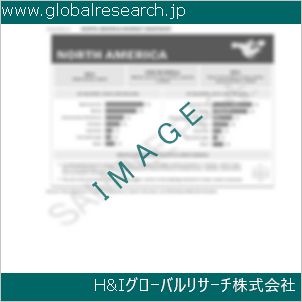1 市場概要
1.1 製品概要と範囲
1.2 市場推定の注意点と基準年
1.3 タイプ別市場分析
1.3.1 概要:グローバルな帯電防止繊維の消費価値(タイプ別):2020年対2024年対2031年
1.3.2 帯電防止ポリエステル
1.3.3 帯電防止ポリアクリロニトリル
1.3.4 帯電防止ポリプロピレン
1.3.5 その他
1.4 用途別市場分析
1.4.1 概要:グローバルな帯電防止繊維の用途別消費額:2020年対2024年対2031年
1.4.2 帯電防止カーペット
1.4.3 帯電防止作業服
1.4.4 塵除去作業服
1.4.5 その他
1.5 グローバル静電気防止繊維市場規模と予測
1.5.1 グローバル静電気防止繊維の消費額(2020年、2024年、2031年)
1.5.2 グローバル静電気防止繊維の販売数量(2020年~2031年)
1.5.3 グローバル静電気防止繊維の平均価格(2020-2031)
2 メーカープロファイル
2.1 TEIJIN
2.1.1 TEIJINの詳細
2.1.2 TEIJINの主要事業
2.1.3 TEIJIN 帯電防止繊維の製品とサービス
2.1.4 TEIJIN 帯電防止繊維の売上数量、平均価格、売上高、粗利益率、市場シェア(2020-2025)
2.1.5 TEIJINの最近の動向/更新
2.2 TORAY
2.2.1 TORAYの詳細
2.2.2 TORAY 主な事業
2.2.3 TORAY 帯電防止繊維の製品とサービス
2.2.4 TORAY 帯電防止繊維の売上数量、平均価格、売上高、粗利益率、市場シェア(2020-2025)
2.2.5 TORAYの最近の動向/更新
2.3 クラレ
2.3.1 クラレの概要
2.3.2 クラレの主要事業
2.3.3 クラレの帯電防止繊維製品およびサービス
2.3.4 クラレの帯電防止繊維の売上数量、平均価格、売上高、粗利益率、市場シェア(2020-2025)
2.3.5 クラレの最近の動向/更新
2.4 ICI
2.4.1 ICIの詳細
2.4.2 ICIの主要事業
2.4.3 ICIの帯電防止繊維製品およびサービス
2.4.4 ICIの帯電防止繊維の売上数量、平均価格、売上高、粗利益率、市場シェア(2020-2025)
2.4.5 ICIの最近の動向/更新
2.5 三菱レイヨン
2.5.1 三菱レイヨン詳細
2.5.2 三菱レイヨン主要事業
2.5.3 三菱レイヨン 帯電防止繊維の製品とサービス
2.5.4 三菱レイヨン 帯電防止繊維の売上数量、平均価格、売上高、粗利益率、市場シェア(2020-2025)
2.5.5 三菱レイヨン 最近の動向/更新
2.6 BASF
2.6.1 BASFの概要
2.6.2 BASFの主要事業
2.6.3 BASFの帯電防止繊維製品およびサービス
2.6.4 BASFの帯電防止繊維の売上数量、平均価格、売上高、粗利益率、市場シェア(2020-2025)
2.6.5 BASFの最近の動向/更新
3 競合環境:メーカー別帯電防止繊維
3.1 グローバル静電気防止繊維の販売数量(メーカー別)(2020-2025)
3.2 グローバル静電気防止繊維の売上高(メーカー別)(2020-2025)
3.3 メーカー別グローバル帯電防止繊維平均価格(2020-2025)
3.4 市場シェア分析(2024年)
3.4.1 メーカー別帯電防止繊維の出荷量(売上高:$MM)と市場シェア(%):2024
3.4.2 2024年の静電気防止繊維メーカー上位3社の市場シェア
3.4.3 2024年の静電気防止繊維メーカー上位6社の市場シェア
3.5 帯電防止繊維市場:全体的な企業足跡分析
3.5.1 帯電防止繊維市場:地域別足跡
3.5.2 帯電防止繊維市場:企業製品タイプ別足跡
3.5.3 帯電防止繊維市場:企業製品用途別足跡
3.6 新規参入企業と市場参入障壁
3.7 合併、買収、契約、および提携
4 地域別消費分析
4.1 地域別グローバル帯電防止繊維市場規模
4.1.1 地域別グローバル帯電防止繊維販売数量(2020-2031)
4.1.2 地域別グローバル静電気防止繊維の消費額(2020-2031)
4.1.3 地域別グローバル帯電防止繊維平均価格(2020-2031)
4.2 北米の帯電防止繊維の消費額(2020-2031)
4.3 欧州の帯電防止繊維の消費額(2020-2031)
4.4 アジア太平洋地域における帯電防止繊維の消費額(2020-2031)
4.5 南米の帯電防止繊維の消費額(2020-2031)
4.6 中東・アフリカ地域 帯電防止繊維の消費額(2020-2031)
5 市場セグメント別(タイプ)
5.1 グローバル静電気防止繊維の売上数量(タイプ別)(2020-2031)
5.2 グローバル静電気防止繊維の消費額(タイプ別)(2020-2031)
5.3 グローバル静電気防止繊維の平均価格(種類別)(2020-2031)
6 市場セグメント(用途別)
6.1 用途別グローバル抗静電気繊維の販売数量(2020-2031)
6.2 グローバル静電気防止繊維の用途別消費額(2020-2031)
6.3 グローバル抗静電気繊維の平均価格(用途別)(2020-2031)
7 北米
7.1 北米の帯電防止繊維の売上数量(種類別)(2020-2031)
7.2 北米の帯電防止繊維の用途別販売数量(2020-2031)
7.3 北米の帯電防止繊維市場規模(国別)
7.3.1 北米の帯電防止繊維の販売数量(国別)(2020-2031)
7.3.2 北米の帯電防止繊維の消費額(国別)(2020-2031)
7.3.3 アメリカ市場規模と予測(2020-2031)
7.3.4 カナダ市場規模と予測(2020-2031)
7.3.5 メキシコ市場規模と予測(2020-2031)
8 ヨーロッパ
8.1 ヨーロッパの帯電防止繊維の売上数量(種類別)(2020-2031)
8.2 欧州の帯電防止繊維の販売数量(用途別)(2020-2031)
8.3 ヨーロッパの帯電防止繊維市場規模(国別)
8.3.1 ヨーロッパの帯電防止繊維の販売数量(国別)(2020-2031)
8.3.2 ヨーロッパの帯電防止繊維の消費額(国別)(2020-2031)
8.3.3 ドイツ市場規模と予測(2020-2031)
8.3.4 フランス市場規模と予測(2020-2031)
8.3.5 イギリス市場規模と予測(2020-2031)
8.3.6 ロシア市場規模と予測(2020-2031)
8.3.7 イタリア市場規模と予測(2020-2031)
9 アジア太平洋
9.1 アジア太平洋地域 帯電防止繊維の販売数量(種類別)(2020-2031)
9.2 アジア太平洋地域 帯電防止繊維の販売数量(用途別)(2020-2031)
9.3 アジア太平洋地域における帯電防止繊維の市場規模(地域別)
9.3.1 アジア太平洋地域における帯電防止繊維の販売数量(地域別)(2020-2031)
9.3.2 アジア太平洋地域における帯電防止繊維の地域別消費額(2020-2031)
9.3.3 中国市場規模と予測(2020-2031)
9.3.4 日本市場規模と予測(2020-2031)
9.3.5 韓国市場規模と予測(2020-2031)
9.3.6 インド市場規模と予測(2020-2031)
9.3.7 東南アジア市場規模と予測(2020-2031)
9.3.8 オーストラリア市場規模と予測(2020-2031)
10 南米
10.1 南米の帯電防止繊維の販売数量(種類別)(2020-2031)
10.2 南米の帯電防止繊維の販売数量(用途別)(2020-2031)
10.3 南米の帯電防止繊維市場規模(国別)
10.3.1 南米の帯電防止繊維の販売数量(国別)(2020-2031)
10.3.2 南米の帯電防止繊維の消費額(国別)(2020-2031)
10.3.3 ブラジル市場規模と予測(2020-2031)
10.3.4 アルゼンチン市場規模と予測(2020-2031)
11 中東・アフリカ
11.1 中東・アフリカ 帯電防止繊維の販売量(種類別)(2020-2031)
11.2 中東・アフリカ地域における帯電防止繊維の販売数量(用途別)(2020-2031)
11.3 中東・アフリカ地域における帯電防止繊維の市場規模(国別)
11.3.1 中東・アフリカ地域 帯電防止繊維の販売量(国別)(2020-2031)
11.3.2 中東・アフリカ地域 帯電防止繊維の消費額(国別)(2020-2031)
11.3.3 トルコ市場規模と予測(2020-2031)
11.3.4 エジプト市場規模と予測(2020-2031)
11.3.5 サウジアラビア市場規模と予測(2020-2031)
11.3.6 南アフリカ市場規模と予測(2020-2031)
12 市場動向
12.1 帯電防止繊維市場の成長要因
12.2 帯電防止繊維市場の制約要因
12.3 帯電防止繊維のトレンド分析
12.4 ポーターの5つの力分析
12.4.1 新規参入の脅威
12.4.2 供給者の交渉力
12.4.3 購入者の交渉力
12.4.4 代替品の脅威
12.4.5 競争の激化
13 原材料と産業チェーン
13.1 帯電防止繊維の原材料と主要メーカー
13.2 帯電防止繊維の製造コストの割合
13.3 帯電防止繊維の製造プロセス
13.4 産業バリューチェーン分析
14 流通チャネル別出荷量
14.1 販売チャネル
14.1.1 直接エンドユーザー向け
14.1.2 卸売業者
14.2 帯電防止繊維の主要な卸売業者
14.3 帯電防止繊維の主要な顧客
15 研究結果と結論
16 付録
16.1 方法論
16.2 研究プロセスとデータソース
16.3 免責事項
1.1 Product Overview and Scope
1.2 Market Estimation Caveats and Base Year
1.3 Market Analysis by Type
1.3.1 Overview: Global Antistatic Fibers Consumption Value by Type: 2020 Versus 2024 Versus 2031
1.3.2 Antistatic Polyester
1.3.3 Antistatic Polyacrylonitrile
1.3.4 Antistatic Polypropylene
1.3.5 Others
1.4 Market Analysis by Application
1.4.1 Overview: Global Antistatic Fibers Consumption Value by Application: 2020 Versus 2024 Versus 2031
1.4.2 Antistatic Carpet
1.4.3 Antistatic Work Clothes
1.4.4 Dust Removal Work Clothes
1.4.5 Others
1.5 Global Antistatic Fibers Market Size & Forecast
1.5.1 Global Antistatic Fibers Consumption Value (2020 & 2024 & 2031)
1.5.2 Global Antistatic Fibers Sales Quantity (2020-2031)
1.5.3 Global Antistatic Fibers Average Price (2020-2031)
2 Manufacturers Profiles
2.1 TEIJIN
2.1.1 TEIJIN Details
2.1.2 TEIJIN Major Business
2.1.3 TEIJIN Antistatic Fibers Product and Services
2.1.4 TEIJIN Antistatic Fibers Sales Quantity, Average Price, Revenue, Gross Margin and Market Share (2020-2025)
2.1.5 TEIJIN Recent Developments/Updates
2.2 TORAY
2.2.1 TORAY Details
2.2.2 TORAY Major Business
2.2.3 TORAY Antistatic Fibers Product and Services
2.2.4 TORAY Antistatic Fibers Sales Quantity, Average Price, Revenue, Gross Margin and Market Share (2020-2025)
2.2.5 TORAY Recent Developments/Updates
2.3 Kuraray
2.3.1 Kuraray Details
2.3.2 Kuraray Major Business
2.3.3 Kuraray Antistatic Fibers Product and Services
2.3.4 Kuraray Antistatic Fibers Sales Quantity, Average Price, Revenue, Gross Margin and Market Share (2020-2025)
2.3.5 Kuraray Recent Developments/Updates
2.4 ICI
2.4.1 ICI Details
2.4.2 ICI Major Business
2.4.3 ICI Antistatic Fibers Product and Services
2.4.4 ICI Antistatic Fibers Sales Quantity, Average Price, Revenue, Gross Margin and Market Share (2020-2025)
2.4.5 ICI Recent Developments/Updates
2.5 Mitsubishi Rayon
2.5.1 Mitsubishi Rayon Details
2.5.2 Mitsubishi Rayon Major Business
2.5.3 Mitsubishi Rayon Antistatic Fibers Product and Services
2.5.4 Mitsubishi Rayon Antistatic Fibers Sales Quantity, Average Price, Revenue, Gross Margin and Market Share (2020-2025)
2.5.5 Mitsubishi Rayon Recent Developments/Updates
2.6 BASF
2.6.1 BASF Details
2.6.2 BASF Major Business
2.6.3 BASF Antistatic Fibers Product and Services
2.6.4 BASF Antistatic Fibers Sales Quantity, Average Price, Revenue, Gross Margin and Market Share (2020-2025)
2.6.5 BASF Recent Developments/Updates
3 Competitive Environment: Antistatic Fibers by Manufacturer
3.1 Global Antistatic Fibers Sales Quantity by Manufacturer (2020-2025)
3.2 Global Antistatic Fibers Revenue by Manufacturer (2020-2025)
3.3 Global Antistatic Fibers Average Price by Manufacturer (2020-2025)
3.4 Market Share Analysis (2024)
3.4.1 Producer Shipments of Antistatic Fibers by Manufacturer Revenue ($MM) and Market Share (%): 2024
3.4.2 Top 3 Antistatic Fibers Manufacturer Market Share in 2024
3.4.3 Top 6 Antistatic Fibers Manufacturer Market Share in 2024
3.5 Antistatic Fibers Market: Overall Company Footprint Analysis
3.5.1 Antistatic Fibers Market: Region Footprint
3.5.2 Antistatic Fibers Market: Company Product Type Footprint
3.5.3 Antistatic Fibers Market: Company Product Application Footprint
3.6 New Market Entrants and Barriers to Market Entry
3.7 Mergers, Acquisition, Agreements, and Collaborations
4 Consumption Analysis by Region
4.1 Global Antistatic Fibers Market Size by Region
4.1.1 Global Antistatic Fibers Sales Quantity by Region (2020-2031)
4.1.2 Global Antistatic Fibers Consumption Value by Region (2020-2031)
4.1.3 Global Antistatic Fibers Average Price by Region (2020-2031)
4.2 North America Antistatic Fibers Consumption Value (2020-2031)
4.3 Europe Antistatic Fibers Consumption Value (2020-2031)
4.4 Asia-Pacific Antistatic Fibers Consumption Value (2020-2031)
4.5 South America Antistatic Fibers Consumption Value (2020-2031)
4.6 Middle East & Africa Antistatic Fibers Consumption Value (2020-2031)
5 Market Segment by Type
5.1 Global Antistatic Fibers Sales Quantity by Type (2020-2031)
5.2 Global Antistatic Fibers Consumption Value by Type (2020-2031)
5.3 Global Antistatic Fibers Average Price by Type (2020-2031)
6 Market Segment by Application
6.1 Global Antistatic Fibers Sales Quantity by Application (2020-2031)
6.2 Global Antistatic Fibers Consumption Value by Application (2020-2031)
6.3 Global Antistatic Fibers Average Price by Application (2020-2031)
7 North America
7.1 North America Antistatic Fibers Sales Quantity by Type (2020-2031)
7.2 North America Antistatic Fibers Sales Quantity by Application (2020-2031)
7.3 North America Antistatic Fibers Market Size by Country
7.3.1 North America Antistatic Fibers Sales Quantity by Country (2020-2031)
7.3.2 North America Antistatic Fibers Consumption Value by Country (2020-2031)
7.3.3 United States Market Size and Forecast (2020-2031)
7.3.4 Canada Market Size and Forecast (2020-2031)
7.3.5 Mexico Market Size and Forecast (2020-2031)
8 Europe
8.1 Europe Antistatic Fibers Sales Quantity by Type (2020-2031)
8.2 Europe Antistatic Fibers Sales Quantity by Application (2020-2031)
8.3 Europe Antistatic Fibers Market Size by Country
8.3.1 Europe Antistatic Fibers Sales Quantity by Country (2020-2031)
8.3.2 Europe Antistatic Fibers Consumption Value by Country (2020-2031)
8.3.3 Germany Market Size and Forecast (2020-2031)
8.3.4 France Market Size and Forecast (2020-2031)
8.3.5 United Kingdom Market Size and Forecast (2020-2031)
8.3.6 Russia Market Size and Forecast (2020-2031)
8.3.7 Italy Market Size and Forecast (2020-2031)
9 Asia-Pacific
9.1 Asia-Pacific Antistatic Fibers Sales Quantity by Type (2020-2031)
9.2 Asia-Pacific Antistatic Fibers Sales Quantity by Application (2020-2031)
9.3 Asia-Pacific Antistatic Fibers Market Size by Region
9.3.1 Asia-Pacific Antistatic Fibers Sales Quantity by Region (2020-2031)
9.3.2 Asia-Pacific Antistatic Fibers Consumption Value by Region (2020-2031)
9.3.3 China Market Size and Forecast (2020-2031)
9.3.4 Japan Market Size and Forecast (2020-2031)
9.3.5 South Korea Market Size and Forecast (2020-2031)
9.3.6 India Market Size and Forecast (2020-2031)
9.3.7 Southeast Asia Market Size and Forecast (2020-2031)
9.3.8 Australia Market Size and Forecast (2020-2031)
10 South America
10.1 South America Antistatic Fibers Sales Quantity by Type (2020-2031)
10.2 South America Antistatic Fibers Sales Quantity by Application (2020-2031)
10.3 South America Antistatic Fibers Market Size by Country
10.3.1 South America Antistatic Fibers Sales Quantity by Country (2020-2031)
10.3.2 South America Antistatic Fibers Consumption Value by Country (2020-2031)
10.3.3 Brazil Market Size and Forecast (2020-2031)
10.3.4 Argentina Market Size and Forecast (2020-2031)
11 Middle East & Africa
11.1 Middle East & Africa Antistatic Fibers Sales Quantity by Type (2020-2031)
11.2 Middle East & Africa Antistatic Fibers Sales Quantity by Application (2020-2031)
11.3 Middle East & Africa Antistatic Fibers Market Size by Country
11.3.1 Middle East & Africa Antistatic Fibers Sales Quantity by Country (2020-2031)
11.3.2 Middle East & Africa Antistatic Fibers Consumption Value by Country (2020-2031)
11.3.3 Turkey Market Size and Forecast (2020-2031)
11.3.4 Egypt Market Size and Forecast (2020-2031)
11.3.5 Saudi Arabia Market Size and Forecast (2020-2031)
11.3.6 South Africa Market Size and Forecast (2020-2031)
12 Market Dynamics
12.1 Antistatic Fibers Market Drivers
12.2 Antistatic Fibers Market Restraints
12.3 Antistatic Fibers Trends Analysis
12.4 Porters Five Forces Analysis
12.4.1 Threat of New Entrants
12.4.2 Bargaining Power of Suppliers
12.4.3 Bargaining Power of Buyers
12.4.4 Threat of Substitutes
12.4.5 Competitive Rivalry
13 Raw Material and Industry Chain
13.1 Raw Material of Antistatic Fibers and Key Manufacturers
13.2 Manufacturing Costs Percentage of Antistatic Fibers
13.3 Antistatic Fibers Production Process
13.4 Industry Value Chain Analysis
14 Shipments by Distribution Channel
14.1 Sales Channel
14.1.1 Direct to End-User
14.1.2 Distributors
14.2 Antistatic Fibers Typical Distributors
14.3 Antistatic Fibers Typical Customers
15 Research Findings and Conclusion
16 Appendix
16.1 Methodology
16.2 Research Process and Data Source
16.3 Disclaimer
| ※参考情報 帯電防止繊維は、静電気の発生を抑制し、衣服や製品の安全性および機能性を向上させるために開発された特殊な繊維です。静電気は、生活の中でさまざまな問題を引き起こす原因となります。例えば静電気は電子機器へのダメージ、火災の原因、さらには人間にとって不快な感覚をもたらします。このような課題を解決するために、帯電防止繊維が重要な役割を果たしています。 帯電防止繊維の定義は、主に静電気の蓄積を防ぐための特性を持つ繊維を指します。一般的には、導電性の素材や特殊な化学処理を施された繊維によって、静電気が発生しにくい構造となっています。これにより、静電気の影響を軽減し、静電気が衣服や製品に及ぼす悪影響を低減します。 帯電防止繊維の特徴としては、まずは導電性の確保が挙げられます。これにより、繊維自体が静電気を放電する能力を持ち、静電気の蓄積を防ぎます。また、摩擦による静電気の発生を抑える効果もあります。さらに、抗菌性や耐水性、耐久性など、さまざまな機能を持たせることが可能です。在庫の繊維とも異なり、これらの機能はユーザーのニーズに応じて選ばれることが多いです。 帯電防止繊維の種類は主に2つのカテゴリーに分けられます。一つは導電性繊維で、もう一つは帯電防止処理が施された繊維です。導電性繊維は、金属繊維やカーボン繊維を用いたもので、直接的に静電気を放電する能力があります。一方、帯電防止処理が施された繊維は、抗静電剤や特殊な化学薬品を用いて、繊維の表面に帯電を抑える効果を持たせています。 用途としては、帯電防止繊維はさまざまな分野で利用されています。特に電子機器の製造や保管の際には、静電気による損傷を防ぐために非常に重要です。半導体製造工場やクリーンルームでは、帯電防止服が着用され、静電気の影響を最小限に抑えています。また、家庭用の衣類やカーペット、車両の内装などにも帯電防止材が使用されており、静電気の発生を防止しています。 最近では、テクノロジーの進歩に伴い、さまざまな関連技術が開発されています。例えば、ナノテクノロジーを利用した帯電防止繊維は、従来の技術よりも高い効果を持つことが可能です。このような繊維は、非常に小さいナノサイズの導電性材料を含むことで、さらに高い導電性を持っています。 また、エコ技術と融合することで、帯電防止繊維が環境に優しい素材としても注目されています。再生可能な資源を使用し、通常の繊維製品と同様に洗濯や使用が可能なため、持続可能なファッションの一環としても考えられています。例えば、ペットボトルから再生されたポリエステル繊維に帯電防止機能を付加した商品も市場に出回り、消費者の選択肢を広げています。 さらに、インターネット技術を活用したスマート繊維も注目されており、帯電防止機能を持ちながら、センサー機能を持つものも開発されています。これにより、衣類が身につけた者の健康状態をモニタリングするなど、さまざまな新しい応用が期待されています。 その他の関連技術としては、気候変動に対応するための温度調整機能を持つ帯電防止繊維や、防火性能を備えた繊維などもあります。これにより、安全性と快適性を両立させる製品の開発が進められています。 このように、帯電防止繊維は静電気管理の重要性が高まる現代社会において、ますます重要な役割を果たしていると言えるでしょう。製造業から日常生活に至るまで、その利用範囲は広く、今後も新たな技術や用途が開発されることが期待されています。 |
❖ 免責事項 ❖
http://www.globalresearch.jp/disclaimer












